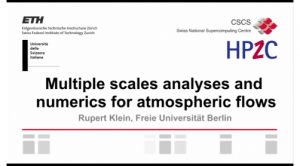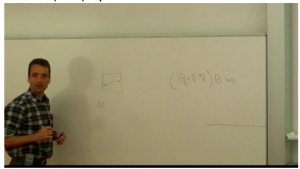HP2C: Two Talks of Rupert Klein on Multiple Scales Analyses and Numerics for Atmospheric Flows
HP2C and the Università della Svizzera Italiana (USI) are happy to present two talks of Rupert Klein, Freie Universität Berlin, Germany.
Multiple scales analyses and numerics for atmospheric flows
Regime(s) of validity of sound-proof models
Abstract
Asymptotic techniques generalize the classical approach of scale analysis in theoretical meteorology. Through, e.g., matched asymptotic and multiple scales expansions they allow us to systematically study interactions across separated length and times scales. This will be demonstrated drawing from recent work on hurricane-like concentrated vortices and on cloud–internal wave interactions.
Whereas the classical theory of anelastic mostions by Ogura and Phillips (1962) is naturally captured in an asymptotics-based framework, its subsequent extensions, e.g., by Dutton & Fichtl (1969), Lipps & Hemler (1982), Bannon (1996), as well as Durran’s pseudo-incompressible model (1989,2008) pose a particular challenge. I will show that their systematic theoretical justification will require techniques that go beyond scale analysis and single or multiple scales expansions.
From these analytical developments one can draw a series of conclusions regarding the construction of robust numerical method for atmospheric flow simulations. The last part of the lecture will highlight how multiscale asymptotics ideas may be combined with numerical multigrid techniques to generate a novel scale-dependent time integration scheme for weakly compressible flows.
BIO
Rupert Klein holds a professorship for “Scientific Computing/Modelling and Simulation of Global Environment Systems” at the Institute for Mathematics and Computer Science at the Freie Universität Berlin. His research is characterised by the merger of applied mathematical modelling and modern computational techniques. During his 20-year academic career he has addressed problems in theoretical and computational fluid mechanics, ranging from high-speed and low-speed combustion, via the dynamics of slender vortices, to multiplescale phenomena in atmospheric flows.
Dr. Klein was born in Wuppertal, Germany, and studied Mechanical Engineering at RWTH Aachen, Germany, where he also received his doctoral degree in 1988. A two-year postdoctoral research fellowship with the Program in Applied and Computational Mathematics at Princeton University, USA, was followed by an assistant professorship with the Department of Mechanical Engineering of RWTH Aachen, Germany. His interest in environmental problems and in man-environment-machine systems led to a professorship with the department of Safety-Technology at Wuppertal University in 1995. Soon afterwards he was jointly appointed by the Potsdam Institute for Climate Impact Research, where he then headed the Data & Computation Department, and Freie Universität Berlin. This appointment placed him at the interface between climate research and modern applied and computational mathematics. In 2007 he joined the Department of Mathematics and Computer Science with a full-time appointment.
Klein was awarded the Horning Memorial Award and the Arch T Colwell Merit Award from the Society of Automotive Engineers (SAE) in 1990, the Bennigsen–Förder Prize from the state of North-Rhine-Westphalia in 1995, and the International Fellow Award from Johns Hopkins University in 1995/96. More recently he was awarded the Gottfried-Wilhelm-Leibniz-Preis of the Deutscheforschungsgemeinschaft, and became a member of the Berlin-Brandenburg Academy of Sciences. Currently, he is a member of the editorial boards of Theoretical and Computational Fluid Dynamics, Computers and Fluids, and Communications in Applied Mathematics and Computational Science.



